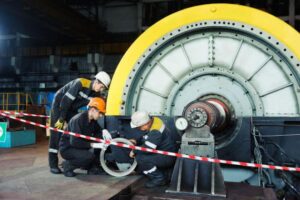
In January and February this year, DTEK Energy’s machine builders manufactured and repaired almost 505 units of mining equipment, including two new shearers for mining operations.
The energy holding said in a press release on Tuesday that machine builders also supported the needs of miners with more than 330,000 spare parts and components.
“Power engineers are working non-stop to restore capacities after the shelling, while miners are supporting sufficient fuel needs of thermal generation. And machine builders are working hard to provide them with equipment, spare parts and everything they need for coal mining,” said DTEK Energy CEO Aleksandr Fomenko.
In January, DTEK Energy’s miners commissioned the first two new coal faces this year.
In 2024, the company’s investments in Ukrainian coal mining amounted to UAH 7.5 billion. These funds were spent on the construction and repair of capital mine workings, completion of coal longwalls, mine tunnelling equipment, underground mine transport and production capacity support projects.
“DTEK Energy provides a closed cycle of electricity generation from coal. The company’s installed capacity in thermal generation amounted to 13.3 GW as of January 2022. The company has established a full production cycle in coal mining: coal mining and enrichment, mechanical engineering, and maintenance of mine equipment.
Currently, most of DTEK Group’s thermal generation facilities have been destroyed as a result of Russian attacks.

Over the past year, DTEK Kyiv Grids has repaired and reconstructed 797 power facilities and 62 km of power lines and carried out 5,000 repairs of cable lines, investing almost UAH 1 billion in these projects.
“This helped to increase the resilience of the capital’s power grids to the challenges of enemy attacks and lay the foundation for a successful heating season,” the company said on its website on Wednesday.
According to the company, to prevent possible accidents, DTEK Kyiv Electricity Networks specialists carried out routine and emergency measures, in particular, repaired more than 46 km of power lines and 731 power facilities, and cleared more than 158 km of routes under power lines to prevent wire breakage due to bad weather.
Implementing its own investment program, which involves the overhaul of existing facilities or the construction of new ones, DTEK Kyiv Grids reconstructed one high-voltage substation, eight distribution points, 44 transformer points and 15 kilometers of cable networks in 2024. In addition, the company upgraded 13 high-voltage substations.
Thus, the quality and reliability of electricity supply was improved for 70 thousand families in the capital.
“Despite the challenges of wartime, we keep our existing electrical equipment in good working order and maintain it on time. We are also gradually implementing a program of technical re-equipment and modernization. In particular, in 2024, we allocated almost UAH 1 billion for such projects,” said Denys Bondar, CEO of DTEK Kyiv Grids.
In 2024, the company’s specialists also installed almost 39 thousand smart meters in the homes of Kyiv residents.
As reported earlier, in 2024, DTEK Grids’ distribution system operators repaired and reconstructed 14.1 thousand kilometers of power lines and more than 6 thousand power facilities, which is 80% more than in 2023.
“DTEK Grids is developing the electricity distribution and power grid operation business in Kyiv, Kyiv, Dnipro, Donetsk and Odesa regions. The company’s DSOs serve 5.5 million households and 158,000 enterprises.
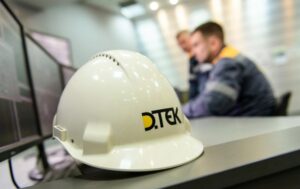
DTEK Group invested UAH 11 billion of its own funds in the restoration of thermal power plants (TPPs) and coal mining in 2024.
“UAH 3 billion was spent on the restoration of TPPs. This made it possible to return more than half of the destroyed capacities to operation before the start of the heating season,” the energy holding said in a telegram channel on Friday.
The company invested UAH 7.5 billion in the mines’ operations: capital repairs, equipment upgrades, and modernization of transport. This ensured coal reserves for the stable operation of the stations.
As the company reminded, last year Russia carried out 13 massive attacks on the Ukrainian energy system, 10 of which were aimed at DTEK’s thermal power plants. At the most critical point of the year, 90% of the facilities were destroyed.
As reported, DTEK Energy BV, the holding company of DTEK Energy, ended 2023 with a net profit of UAH 13.675 billion against a net loss of UAH 5.798 billion in 2022.
“In 2023, DTEK Energy also invested about UAH 11 billion in the repair campaign at thermal power plants and Ukrainian coal mining, which is almost twice as much as in 2022, when investments amounted to about UAH 6 billion.
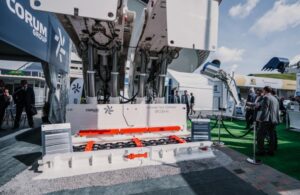
“Corum Druzhkovka Machine-Building Plant (Corum DrMZ), a part of Corum Group (DTEK Energy), is completing the production of three oscillating platforms for DTEK Pavlohradvuhillya mine, Corum reported on Facebook.
According to the report, the oscillating platform is a special equipment that ensures smooth movement of trolleys between the rails of the mine’s receiving platform and the cage moving in the vertical shaft. The entrance platform allows trolleys to enter and exit the mine without any obstacles.
According to the company, this is the first time such equipment has been manufactured for Dniprovska mine. Its service life is more than 20 years.
“The oscillating platforms are ready to be delivered to customers,” the statement said.
“Corum DrMZ, which will be relocated to Dnipro in 2022, according to the report, produced 430 units of mining equipment in January-November this year, as well as more than 850 thousand units of components and spare parts.
Corum Group is a leading mining equipment manufacturer in Ukraine. It is a part of DTEK Energy, an operating company responsible for coal mining and coal-fired power generation within Rinat Akhmetov’s DTEK energy holding.
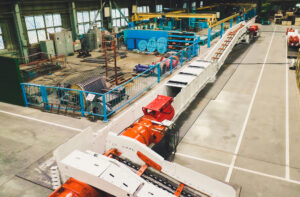
“Corum Druzhkovka Machine-Building Plant (Corum DrMZ), a part of Corum Group (DTEK Energy), plans to complete the delivery of the last batch of steel structures under a large order from DTEK Energy for the production of equipment for concentration plants in February 2025, the plant said on Facebook.
“In April-2024, the machine builders mastered the production of tanks, in June they added reloading devices, and in July the plant began working on the production of more than 500 units of metal structures of almost 100 varieties,” the statement said.
“Corum DrMZ clarifies that the largest parts in the order are 20 meters long and 2.2 meters wide, and their weight exceeds 4 tons. More than 400 tons of metal have already been used for manufacturing.
“There are high requirements for production, in particular in terms of welding seams and painting,” the plant notes.
“Corum DrMZ, which was relocated to Dnipro in 2022, according to the plant, produced 430 units of mining equipment in January-November this year, as well as more than 850 thousand units of components and spare parts.
In particular, in November, the company produced 5 units of shearers, more than 81 thousand components and spare parts, and repaired a KPD shearer. The products include trolleys, skip, cage, main ventilation fan, universal wheelsets, anchors, fire pipes and high-pressure hoses.
Corum Group is a leading mining equipment manufacturer in Ukraine. It is a part of DTEK Energy, an operating company responsible for coal mining and coal-fired power generation within Rinat Akhmetov’s DTEK energy holding.
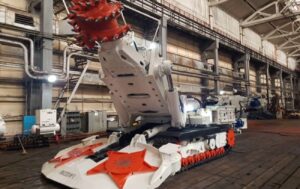
In January-September 2024, DTEK Energy’s machine builders manufactured and repaired 982 units of mining equipment, including 10 new tunnelling and shearers, and provided miners with 758,000 spare parts and components, the company said in a press release on Friday.
“Power engineers have been continuing to restore the power plant 24/7 for many months. Miners are mining coal and maintaining sufficient fuel supplies at thermal power plants, and machine builders are helping them with this by providing the necessary equipment. The key thing for everyone is to restore capacities as soon as possible and to improve the reliability of Ukrainian thermal power plants during the winter,” said DTEK Energy CEO Oleksandr Fomenko, as quoted in the document.
According to the energy holding, thanks to the support of machine builders in equipment, the company’s miners have commissioned 16 new coal faces in the first nine months of this year and plan to commission another 9 by the end of the year.
DTEK Energy’s investments in Ukrainian coal mining are expected to reach about UAH 7.7 billion in 2024.
As reported, in 2023, the company’s investments in Ukrainian coal mining amounted to about UAH 7 billion, which is almost twice as much as in 2022.
“DTEK Energy provides a closed cycle of electricity generation from coal. As of January 2022, the company’s installed capacity in thermal generation amounted to 13.3 GW. The company has established a full production cycle in coal mining: coal mining and enrichment, mechanical engineering, and maintenance of mine equipment.
Currently, most of DTEK Group’s thermal generation facilities have been destroyed as a result of Russian attacks.